A 2019 study found that 37.9 million Americans experience bilateral hearing loss. (1) Over-the-counter (OTC) hearing aid brands like Audicus are championing a path forward by offering more affordable and accessible alternatives to prescription devices. The U.S. Food and Drug Administration says OTC hearing aids make it more accessible for people with mild to moderate hearing loss to access treatment and support when they need to program, adjust, or repair their devices. (2)
Audicus makes affordable hearing aids rooted in quality. We evaluated three popular Audicus hearing aids along with the brand’s pricing and support services. The Audicus Omni 2 offers high-tech sound clarity at budget-friendly prices. Its other models, the Spirit 2 and the Wave 2 have similar technology, which we think stands up well to competitor brands.
Our favorite Audicus hearing aid
Our top pick from Audicus is the Omni 2 because it packs the most features into a sleek, cost-conscious device. Speech Finder technology and universal Bluetooth deliver excellent sound quality in the most common environments, including optional settings for telecoil and tinnitus symptom relief. The small receiver-in-canal (RIC) design is ideal for everyday wear.
Our picks for the best Audicus hearing aids
Compare Audicus hearing aids
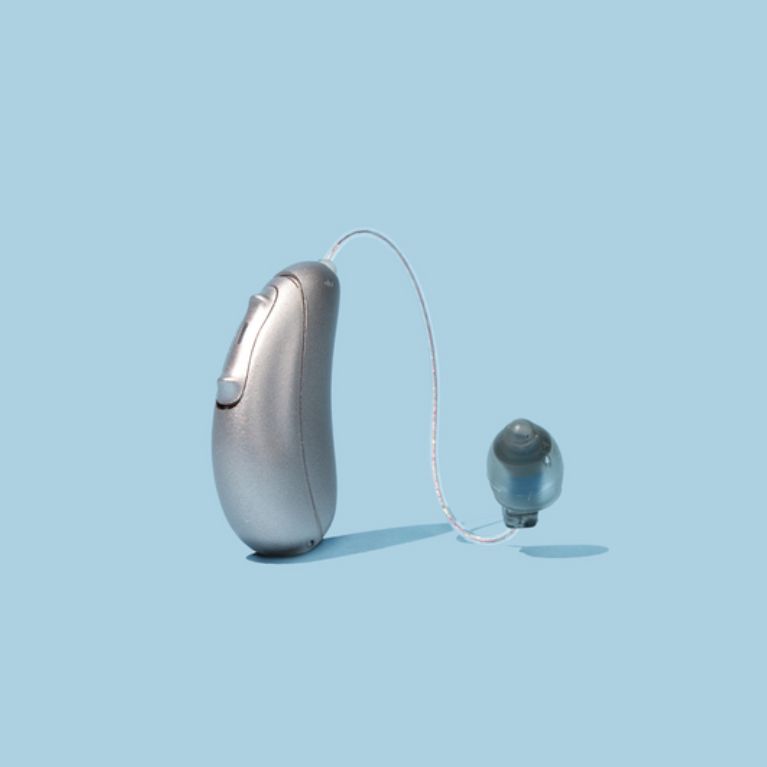
|
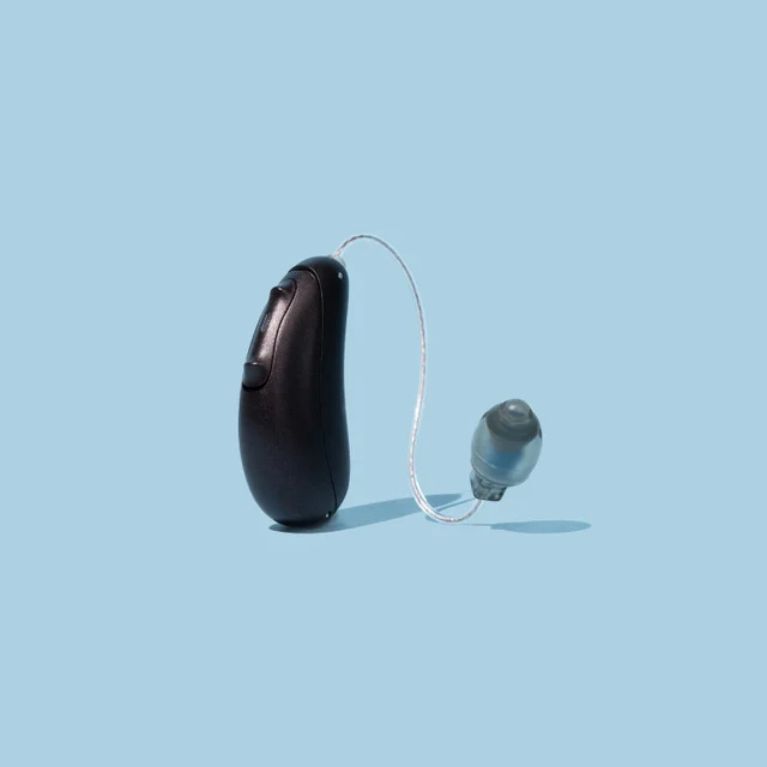
|
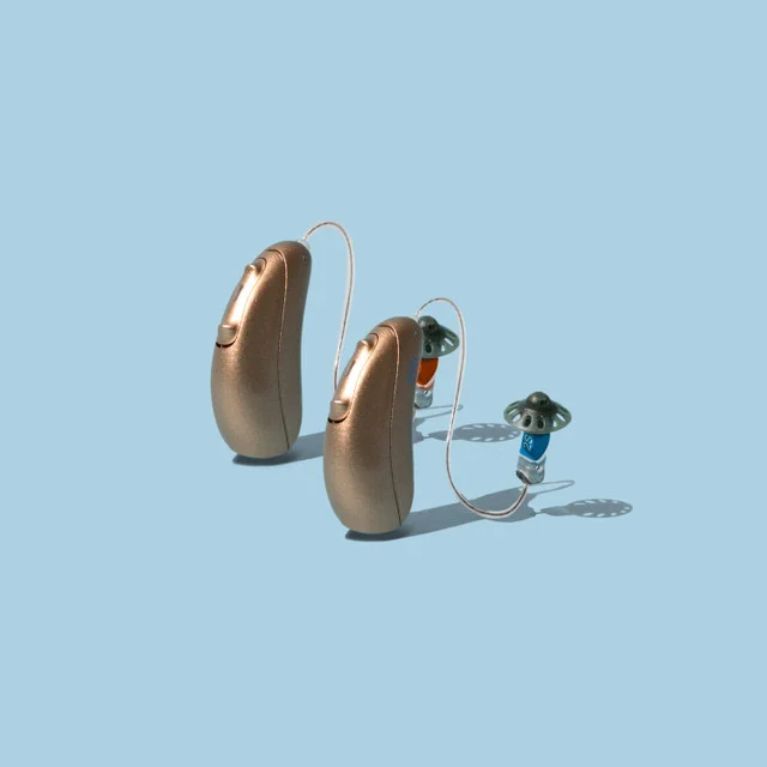
|
|
| Audicus Omni 2 | Audicus Spirit 2 | Audicus Wave 2 | |
| Rating | |||
| Price per pair | $1,898–$1,998 | $1,648–$1,748 | $1,398–$1,498 |
| Style | RIC | RIC | RIC |
| Battery | Rechargeable or replacement battery | Rechargeable or replaceable battery | Rechargeable or replaceable battery |
| Bluetooth | Yes | Yes | Yes |
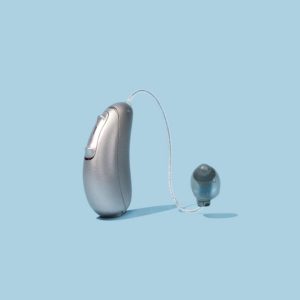

Key product features
What you should know
The Audicus Omni 2 is an advanced OTC, receiver-in-canal (RIC) hearing aid designed for people with mild to moderate hearing loss. It’s the brand’s smallest and most high-tech hearing aid and is priced competitively with other devices. Wearers can also opt for unlimited remote telecare and upgrades every 18 months when they purchase a Premier membership for $99 a month.
- The Omni 2 is the smallest RIC model in the brand’s lineup. It is designed to automatically clarify sounds in noisy environments without you needing to adjust the settings yourself.
- The device costs $1,898 (disposable battery) and $1,998 (rechargeable), which is about the average for other OTC hearing aids on the market.
- We recommend the Omni 2 to people who frequent crowded places (restaurants, social gatherings, concerts, outdoor settings) and need extra speech enhancement and noise reduction.
- Includes four hearing modes (universal, conversation in noise, place of worship, car/plane) and two optional modes (tinnitus, custom) for advanced sound customization.
- Tech-smart users will appreciate the advanced features like streaming, hands-free calling, and directional microphones.
Audicus Omni 2 overview
Features and performance
The Omni 2’s defining feature is its Speech Finder technology, which is especially helpful for clarifying sounds in crowded settings and noisy environments—where individuals with hearing loss report struggling the most. (3) This technology automatically detects and isolates speech while reducing background noise. The Omni 2 has six hearing modes that auto-adjust to the environment around you.
Many OTC hearing aids have Bluetooth technology, but Audicus levels up by allowing you to connect to two devices at once. In this setting, you can seamlessly switch between music and your phone. Bluetooth also allows you to answer phone calls via the hearing aid’s microphone, completely eliminating the need to handle the phone for calling. Audicus and Jabra Enhance are the only OTC brands that offer this feature.
All four Audicus hearing aids are powered by a disposable battery, but you can make them rechargeable devices for a fee. Our testers appreciated the flexibility of this feature, as wearers are particularly choosy about how their devices are powered. That said, the rechargeable battery life only lasts 16 hours. And unlike other brands that include a portable charging case as part of the package, on-the-go charging features cost an additional $99. However, the optional Power Pack, Audicus’ portable charger, holds seven charging cycles or seven days’ worth of battery—this is pretty generous among OTC brands.
Programming and adjustments
One thing we love about Audicus is that you won’t need to program your devices as part of the setup process. While hearing aid brands like Lexie and Eargo require you to program your own devices upon delivery, Audicus employs a team of hearing specialists who will use the results of your online hearing test or existing audiogram to program them before shipping. This means the hearing aids arrive fully programmed to your hearing loss.
However, we think making future adjustments with the Omni may be tricky. If you live in Chicago, Denver, or New York City, you can visit one of Omni’s clinics for an adjustment. If you live outside these cities, you will need to ship the hearing aids back to HQ or make adjustments at home with the help of phone support.
Other brands allow you to make continual adjustments at home via the app and connect with a hearing specialist for questions. Audicus does things differently, offering “update packages” that ask you to send your devices to a specialist—though this means you’d be without your Audicus hearing aid until it’s returned to you. (The brand states this process aims to cut costs associated with maintaining your devices.) Hearing aid users who don’t want to visit a clinic or prefer a more hands-off approach may benefit from this business model. We wish Audicus offered better remote support services via video tutorials and real-time adjustments that users can make independently. These features are becoming more common across hearing aid brands.
Price and value
A pair of Omni 2 rechargeable hearing aids costs just under $2,000. These prices fall within the middle range of competitor OTC pricing and are more affordable than prescription devices, which can easily exceed $6,000. (4) We feel comfortable recommending Audicus hearing aids as a lower-cost option for users exploring ways to improve their hearing.
Customers can also lease hearing aids through the Audicus Premier membership program, simplifying the costs of cleaning and maintaining your hearing aids. The program costs $99 per month.
What customers are saying
Audicus has a 4.23 out of 5-star rating on the Better Business Bureau (BBB). Customers appreciate the brand’s fast service, easy online ordering, and the technical support team that programs the hearing aids before shipping.
Verified BBB reviewer Bill S. praised Audicus’s customer service, even though he experienced some programming troubles initially. “Great service, great staff. It’s hard these days to find a company that will keep working with you until you’re completely happy. I had some issues at the beginning, but they worked with me for many days it was multiple times a day. Now, for over three weeks not a single problem, they work great, and best of all, I can hear things I haven’t heard in years. Amazing! I would recommend the Omni2 style to anyone.”
Some reviewers caution that they received their refund late, even when a return was initiated within the trial period. Others reference needing several rounds of repairs over the hearing aid’s lifetime. While Audicus will complete the repairs as part of their service agreement, shipping and fixing them takes time.
“These hearing aids are great. My experience with this company has been outstanding. Audicus performed an online hearing test that matched the one I had at a brick-and-mortar store. I saved over $4,000. I Love these hearing aids.”
Dean R., BBB.
Who the Audicus Omni 2 hearing aid is recommended for:
- Anyone searching for a higher-tech hearing aid: The Omni 2 uses Unitron technology from Sonova. Sonova also makes Phonak prescription hearing aids that sell for $4,500+. Audicus users can utilize automatic sound adjustments, tinnitus symptom suppression, and Bluetooth for a fraction of the price.
- People who prefer a sleek, discreet design: The Omni 2 is 10% smaller than the Omni 1, making it the brand’s smallest and lightest RIC product.
- Those who want to lease their hearing aids: Audicus offers a unique leasing option that includes everything you need to enjoy your devices for a long time, including service, warranty, and upgrades every 18 months for $99 per month.
- Wearers with mild to moderate hearing loss: Audicus hearing aids, like most OTC hearing aids, are best suited for individuals with mild to moderate hearing loss. If you have trouble hearing the TV and conversations in noisy environments, or others’ speech sounds muffled, the Omni 2 may help clear things up for you.
Who the Audicus Omni 2 hearing aid is not recommended for:
- Anyone shopping for in-the-canal devices: Audicus manufactures three RIC styles and one lower-tech CIC model. While the Omni 2 is the brand’s smallest RIC device, it will still be visible on your ear.
- People prioritizing battery life: The Omni 2 only lasts about 16 hours fully charged (less if streaming). Other brands offer hearing aids that last 18 to 24 hours on one charge. Plus, Audicus is one of the few brands that charge extra for its portable charging cases, which extend battery life outside the home.
- Individuals with severe or profound hearing loss: If you have significant hearing loss or specific hearing needs that require a prescription device, Audicus may not be your best option. OTC hearing aids lack the custom fittings and programming ideal for treating complex hearing loss.
How we rated the Audicus Omni 2
We rated Audicus Omni 2 hearing aids a 4.9 out of 5 overall rating based on the following performance categories:
- Performance: Sound quality, noise reduction, feedback control, programmability, and connectivity
- Features: Durability, battery options, hearing loss range, wireless connectivity, water resistance, and safety features
- Value: Insurance coverage and financing options
- Customer experience: Shipping, warranty, and customer support
Read our full hearing aids testing methodology to learn about our rating process.
Warranties and policies
Audicus hearing aids and accessories are covered by a two-year manufacturer warranty from the date your product was shipped, which covers repairs from manufacturing defects.
Outside this warranty window, you may pay a small fee to repair your hearing aids: $50 per pair for cleaning due to ear wax buildup and $199 per hearing aid for more extensive damage requiring manufacturer repair. If you need to replace the devices, Audicus will offer a trade-in value you can put toward a replacement option for a new hearing aid model based on the age and condition of your current model.
We commend Audicus for doing what it can to earn customer trust by offering wearer-friendly programs that encourage long-lasting and regular use, such as:
- Free adjustments: Audicus will adjust the sound quality and amplification settings on the hearing aid for free, which helps ensure you experience better hearing, though this requires shipping your device off for an update.
- Upgrade options: If you want to upgrade to a new model, you can gift your hearing aids to a friend or family member. For a small change fee, the new user will get the devices and have unlimited free reprogrammings.
Additional repair subscription options
Audicus is unique because it offers customers the option to buy additional after-purchase care support. This service aims to reduce the concern that hearing aid users often have about their devices not working. Research shows that device malfunction and hearing aid maintenance are common reasons why people with hearing aids don’t wear them. (5)
Plus, hearing aids with wax buildup or excess moisture can irritate your ear and distort sound quality, so proper maintenance is key to helping you avoid complications and hear better. (6)
- With the Audicus Care subscription, wearers receive a delivery of hearing aid supplies every three months to keep their devices in top condition. These include domes, ear wax guards, batteries, cleaning brushes and wipes, and a drying capsule.
- The Audicus Protect subscription covers devices against damage and loss for three years and a $195 copay for loss replacements. (This is significantly less than the replacement fee you’d incur without the plan.) The subscription also includes unlimited checkups and cleanings.
Specs
| Style | RIC |
| Battery | Rechargeable or replaceable battery |
| Bluetooth | Yes |
| Prescription | No, OTC |
| Warranty | Two years |
| Financing | Yes |
| Dimensions | N/A |
Additional models from Audicus
Audicus makes two additional RIC-style hearing aids with sound optimization and audiology support. All models can be made with a rechargeable or replaceable battery. Our testers recommend charging your devices for no more than 48 hours to preserve the battery life. Audicus lacks the safeguards other brands put in place that automatically stop charging once they reach full charge.
Compare the models below to find one that fits your budget and lifestyle.
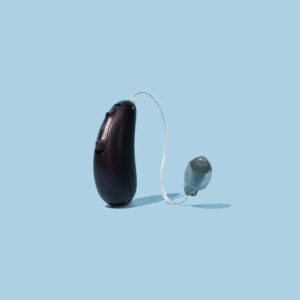

Key product features
Recommended for:
- Tech-savvy individuals who want a feature-rich device for a more reasonable price.
- Wearers searching for a hearing aid that improves sound in common environments like restaurants and outdoors.
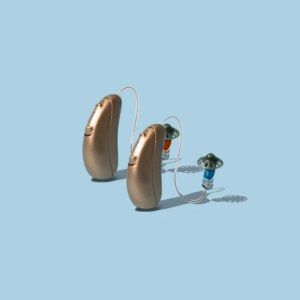

Key product features
Recommended for:
- People with quieter lifestyles who need help hearing at home or in casual settings
- Users who want an affordable device with key features like telecare support
Audicus Omni 2 vs. competitors
If you’re searching for customized hearing aids on a budget, Audicus has some of the best options available. That said, Audicus’s most affordable model is still over $1,000, forcing some wearers to find a lower-priced option. Jabra hearing aids, specifically the Jabra Enhance, are the only devices with similar features for a comparable price.
The Lexie B2 Plus, for example, retails for under $1,000 and doesn’t sacrifice key technology features like Bluetooth and noise reduction.
If budget is of top concern, the Audien Atom 2 is an affordable hearing aid that offers basic functionality and no app controls.
Always compare hearing aid styles when shopping for a hearing aid. The Omni 2 is a RIC hearing aid, which may turn away people who prefer the more popular in-the-canal styles that are less visible. (7)

|
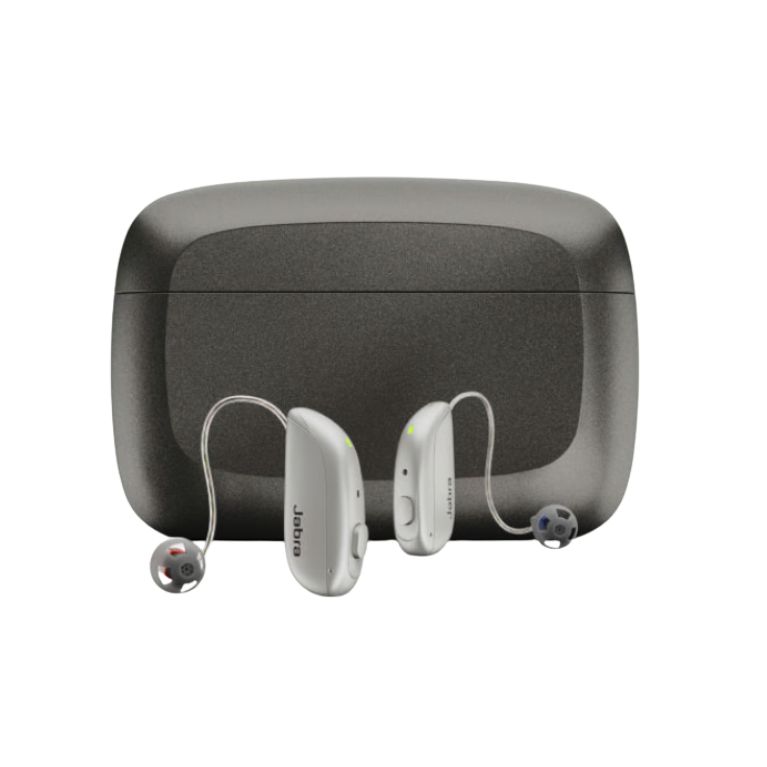
|
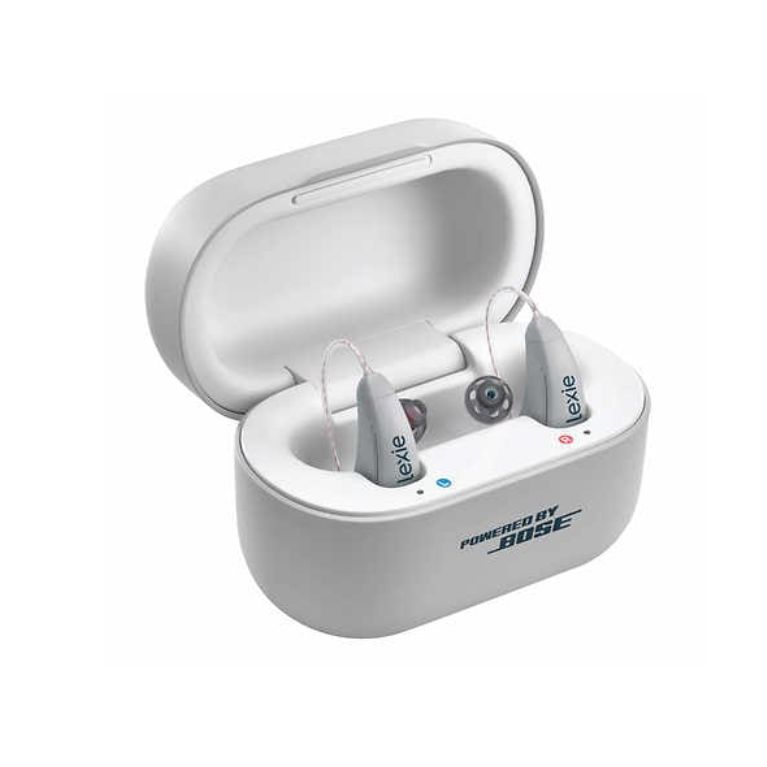
|
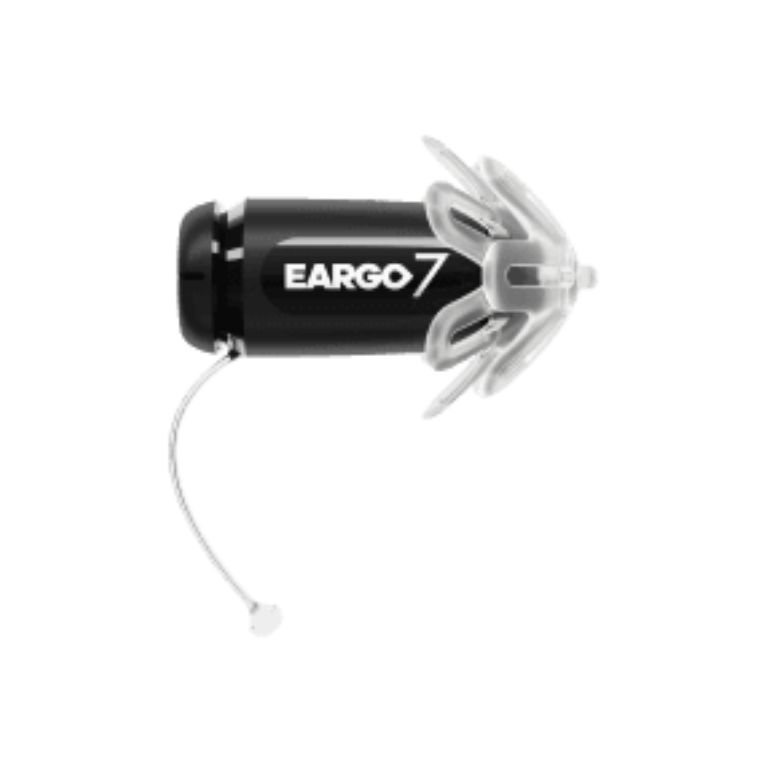
|
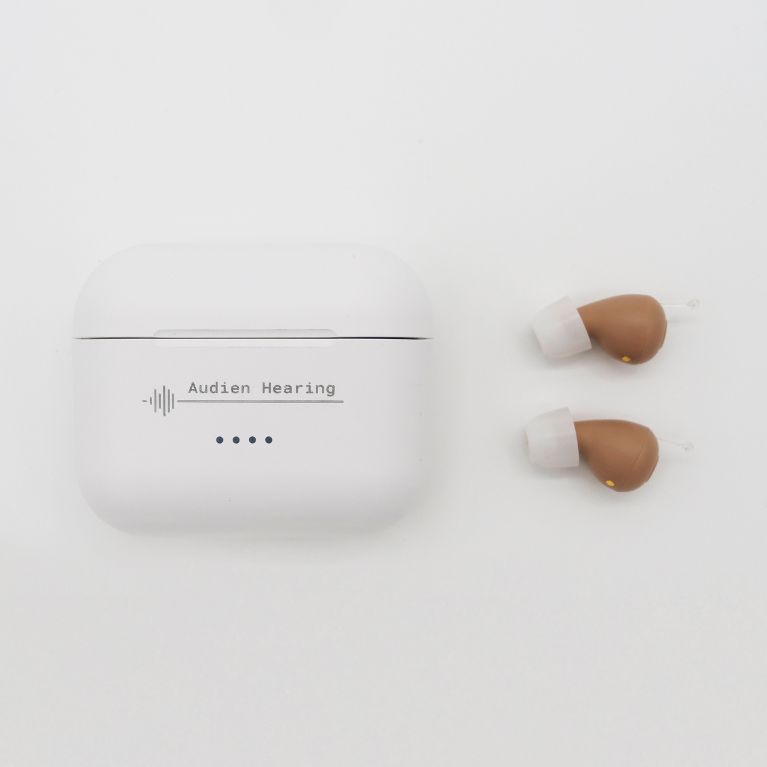
|
|
| Audicus Omni 2 | Jabra Enhance Select 500 | Lexie B2 Plus | Eargo 7 | Audien Atom 2 | |
| Rating | |||||
| Price | $1,898–$1,998 | $1,795–$1,995 | $999 | $2,950 | $189–$289 |
| Style | RIC | BTE | RIC | CIC | ITE |
| Battery | Rechargeable or replacement battery | Rechargeable | Rechargeable | Rechargeable | Rechargeable |
| Bluetooth | Yes | Yes | Yes | No | No |
Audicus hearing aid app
Many hearing aids, like those from Signia, Starkey, and Lexie, come with companion apps so wearers can make quick adjustments via their smartphones. However, we think Audicus needs more time to develop its app. Our testers say the Audicus app is pretty basic and lacks any helpful features that make it worth using—especially since the hearing aids claim to adjust to different settings automatically.
You can use the Audicus hearing aid app to control your Wave, Spirit, and Omni hearing aids directly from your phone. The app allows you to make basic volume and balance adjustments and access different listening modes if your Audicus model doesn’t do this automatically. If you prefer to forgo the app for a simpler adjustment method, a remote control is available.
Audicus hearing test
I’ve taken hearing tests offered by many of the top OTC hearing aid companies and found Audicus’ test the easiest and the most straightforward. While the brand doesn’t include an audiogram in its results, it claims its online hearing screening results are within 10 decibels 85% of the time, compared to clinical audiograms.
If you have a recent audiograph, you can email, fax, or text it to Audicus or send it via the link on the company’s website. An Audicus hearing professional will review your results and recommend a model that suits your type of hearing loss. Allowing users to upload an audiogram in lieu of the test is a great feature, as we know the chart can be especially useful when evaluating hearing loss. (8)
I completed the test in 10 minutes. The results included detailed explanations about the tones I may have trouble hearing, such as dogs barking and TV conversations.
Audicus collects more personal information than all other brands—they will only start the test after you provide your email, phone number, age, zip code, and gender.
Audicus hearing aid prices
Audicus hearing aids cost between $1,398 and $2,498, depending on the model you choose. The price of each model fluctuates by $100 based on whether you opt for rechargeable or replaceable batteries. Audicus’ pricing is on par with other OTC hearing aids with comparable features, but it stands out for its customer service and repair plans.
Audicus is one of the only brands that offer leasing programs for those who want all-inclusive pricing and model upgrades every 18 months. You can lease the Omni 2 for $249 upfront plus $119 per month and the Spirit 2 for $249 upfront and $99 per month. The Audicus Premier leasing membership includes loss and damage protection, regular supply deliveries, an unlimited warranty, and cleaning.
How to choose the best hearing aid for you
The right hearing aids for you depend on the type and degree of hearing loss you have. It’s also important to consider the cost of the device, its technology and features, and your personal preferences. You’ll have an easier time selecting the best hearing aid for you if you start with a hearing test to learn about your type of hearing loss. From there, you can prioritize features that suit your treatment needs and lifestyle.
Hearing aids vary in cost and technology, and what’s right for you may not suit another. Consult an audiologist or hearing health professional to determine the best hearing aids for your needs. They’ll recommend styles and models you can comfortably handle with the technology you need to treat your type of loss. For example, invisible hearing aids can be tough to manipulate when putting them in your ears or changing the batteries.
Related post: How do hearing aids work?
FAQs
Who makes Audicus hearing aids?
Audicus hearing aids are made by Unitron, which is owned by Sonova, a well-known manufacturer of hearing aids based in Switzerland. Sonova also owns Phonak, which makes prescription hearing aids with advanced technology for around $4,500.
Is Audicus a good company?
Audicus is accredited by the Better Business Bureau with an A rating, and its devices are FDA-registered. The company offers affordable hearing aids with key features like noise reduction, Bluetooth technology, and rechargeable batteries.
Our experts
Dr. Heidi Moawad
Dr. Heidi Moawad is a neurologist and teaches at Case Western Reserve University School of Medicine in Cleveland, Ohio. She serves on the editorial board of Neurology Clinical Practice and is a reviewer for Neurology.
Krista Manning
Krista Manning is an accomplished medical copy editor and fact-checker who stands out in the pharmaceutical, health, and wellness domains. With a meticulous eye for detail and a command of medical language, Krista ensures the accuracy and clarity of content. Beyond her professional expertise, Krista is an advocate for mental health awareness. Recognizing the crucial intersection of psychological and physical well-being, she actively contributes to projects that promote mental health awareness within the healthcare narrative. Krista’s commitment extends beyond the pages she edits, emphasizing the holistic nature of health communication.

Lauren Hamer, CFEI, CPRW
Lauren Hamer, CFEI, CPRW
About Author
Sources
- Rein, D. B. et al. The prevalence of bilateral hearing loss in the United States in 2019: a small area estimation modelling approach for obtaining national, state, and county level estimates by demographic subgroup. The Lancet Regional Health, Americas. 2024; Volume 30, 100670. https://www.thelancet.com/journals/lanam/article/PIIS2667-193X(23)00244-2/fulltext
- U.S. Food and Drug Administration. OTC Hearing Aids: What You Should Know. Accessed October 23, 2024.
- The Harvard Gazette. Hidden hearing loss revealed. Accessed October 23, 2024.
- Medical News Today. Hearing Aid Cost and Pricing: Prescription and OTC Options. Accessed October 23, 2024.
- McCormack, A., Fortnum, H. Why do people fitted with hearing aids not wear them? International journal of audiology. 2013; 52(5), 360–368. https://pmc.ncbi.nlm.nih.gov/articles/PMC3665209/
- Orji, F. T., O Onyero, E., & Agbo, C. E. The clinical implications of ear canal debris in hearing aid users. Pakistan journal of medical sciences. 2014; 30(3), 483–487. https://www.ncbi.nlm.nih.gov/pmc/articles/PMC4048490/
- Lauren Pasquesi, AuD, et al. Survey Details OTC Self-Fitting Hearing Aid Users’ Experiences, Perceptions. The Hearing Review. Dec. 27, 2023. https://hearingreview.com/hearing-products/hearing-aids/otc/survey-details-11000-otc-self-fitting-hearing-aid-users-experiences-perceptions
- Salmon, M. K., Brant, J., Hohman, M. H., & Leibowitz, D. (2023, March 1). Audiogram interpretation. StatPearls – NCBI Bookshelf. https://www.ncbi.nlm.nih.gov/books/NBK578179/#:~:text=Aud
- U.S. Food and Drug Administration. Are There “FDA Registered” or “FDA Certified” Medical Devices? How Do I Know What Is FDA Approved? Accessed October 22, 2024.
- U.S. Food and Drug Administration. Regulatory Requirements for Hearing Aid Devices and Personal Sound Amplification Products. Accessed October 22, 2024.
